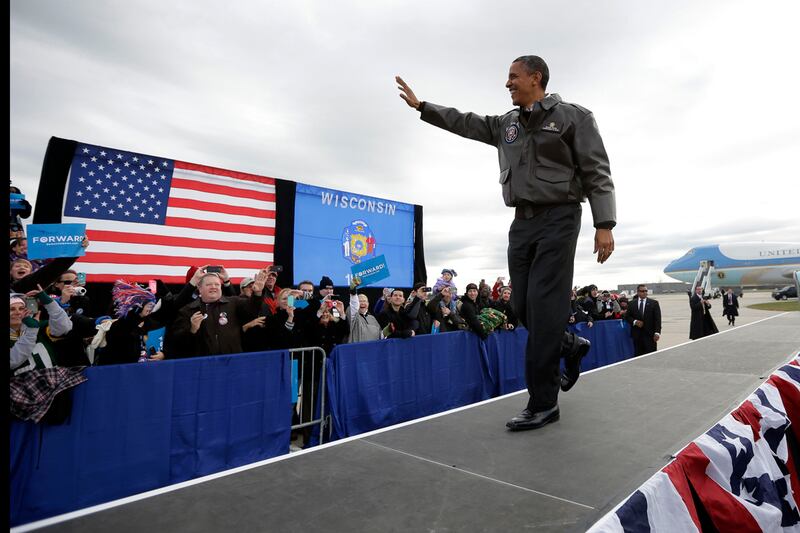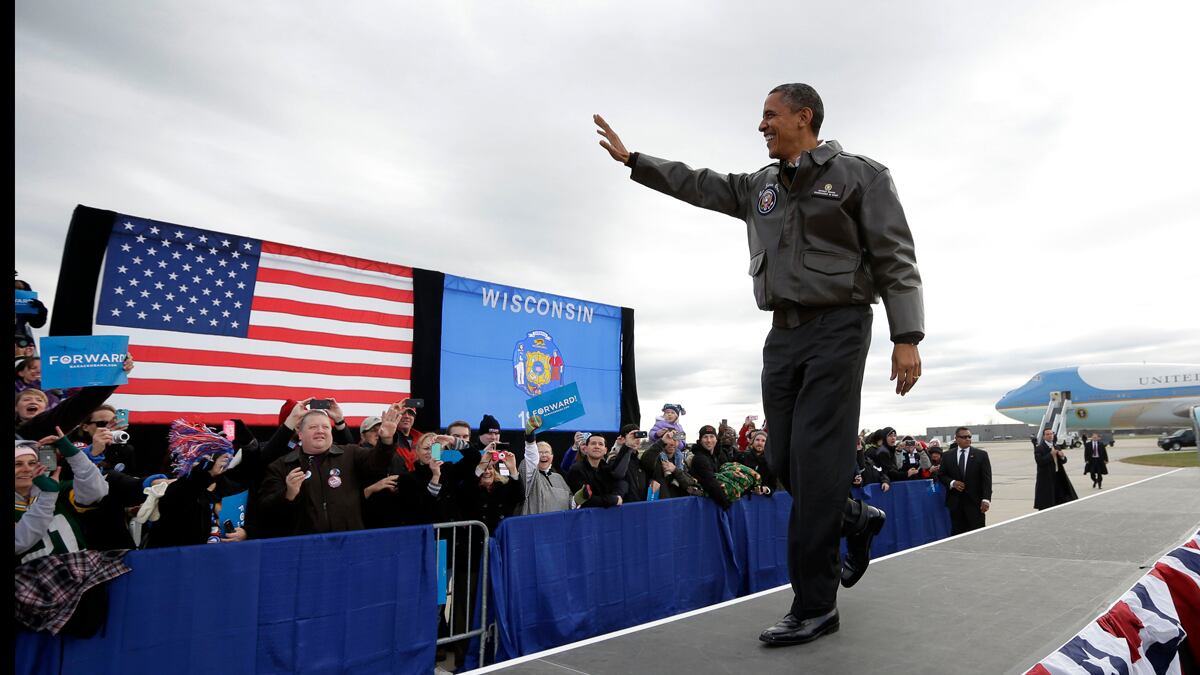Draw a line along President Obama’s endorsements by Mayor Bloomberg and The Economist, his post-Sandy stand with Chris Christie, and the deployment of Colin Powell ads to the swing states, and you’ll see why the president suddenly has the Big Mo—Moderate Momentum—heading into the preelection weekend.

Mitt Romney surged in the polls after recentering his candidacy in the first debate. The return of Moderate Mitt briefly swayed swing voters who voted for Obama in 2008 because of his core promise to bridge the hyperpartisan divides of the Bush years. Those divides have not only persisted but proliferated, leaving Romney able to suddenly (and however improbably) promise that he could be that agent of change. It was an effective pitch as long as there was no reminder of Republican recalcitrance in Congress or memory of the self-described “severe conservative” Mitt Romney who’s been running for president for the past two years.
Ten days ago, when I started out on the CNN Battleground Bus Tour in Florida after the third and final presidential debate, the Romney wave was still cresting. But a week is a long time in politics, and now in Ohio that surge has stalled and the deeper trends from the longer campaign have reasserted themselves.
Certainly, Hurricane Sandy has given the president the opportunity to appear, well, presidential. It has highlighted his cool, pragmatic leadership style—so at odds with the overheated stereotype Republicans try to sell their supporters.
Here was the president suspending his campaign to focus on keeping citizens safe, ordering government agencies to cut through all red tape, and working with a frequent Republican critic, Chris Christie—united in their determination to put politics aside to do the people’s business. It gave rise to an Internet image that rocketed its way through cyberspace because it captured much of the missing hope of this election—echoing the brief moment of national unity after 9/11—and imagining what could occur after Nov. 6 if we return to our senses.
Here in Ohio, there are some tangible signs of the underlying shift. Make no mistake, this election is still very close, but President Obama has maintained a small but steady lead in the polls here. We are deep in the partisan spin cycle that pretends each party has momentum no matter what the polls say—they will latch on to any outlier or cite secret polls or openly muse about a hoped-for Bradley Effect. Logic and perspective left the building a long time ago.
But here’s what we know, at least here in Ohio. Roughly one quarter of the Buckeye State electorate had voted early as of five days ago, according to the most recent CBS News/New York Times poll—and of that significant segment, President Obama was beating Mitt Romney by 60 percent to 34 percent—or a 26-point spread. It’s tough to spin this into good news for the Romney campaign.
Here’s what we also know: Mitt Romney spent some of the last few days campaigning in Florida, a state he seemed to have put away until polls started shifting back in the last five days, along with Virginia, Colorado, and North Carolina. The Romney campaign also released a somewhat desperate Spanish-language ad trying to tie President Obama to Fidel Castro and Hugo Chávez. It didn’t comport with their stated desire to be high-minded and bring Americans together in the final stretch of the campaign. Instead, it reflects anxiety about their hold on the Sunshine State, and a need to increase their percentage of the Hispanic vote there.
Then there’s this bit of scheduling insight: Mitt Romney will be campaigning in Pennsylvania on the final Sunday before the election. This either speaks to amazing confidence that comes from their internal polls showing what no public polls show—namely that Romney can win Pennsylvania on the road to an early night landslide—or it reflects a shotgun approach to trying to cobble together 270 electoral votes.
Back here in Ohio, I can attest to some local observations. The Romney campaign’s risky decision to double down on Mitt’s mistaken claim that Jeep “is thinking of moving all production to China” with a radio ad in Toledo and then a TV ad statewide has proved unwise.
A G.M. spokesman fired back at the Romney campaign, calling the ad “campaign politics at its cynical worst.” When a certain comb-overed blowhard repeated the ad’s claim via Twitter, Chrysler Group Vice President for Product Design Ralph Gilles tweeted back “you are full of shit”—and then clarified a few hours later, saying, “I apologize for my language, but lies are just that, lies.”
This fact-check back and forth mattered less than the fact that the issue resonated on the ground here in Ohio, where the auto bailout has been key to a recovering economy. There is a frustrated awareness of the ad’s dishonesty and a sense of disappointment at the transparently cheap tactic. It has backfired by reinforcing Romney’s reputation for saying anything to score political points.
Romney’s difficulty in getting an edge here—even after the first-debate surge—also has to do with the Buckeye State’s deep working-class and middle-class ethic. This is one place where the onslaught of Bain ads had an effect, because so much local manufacturing has been outsourced by big-promising high-finance guys over the past three decades. And now, with manufacturing starting to slowly come back—with Ohio’s unemployment rate lower than the nation’s—it is tough to sell superrich Mitt Romney as their economic savoir, someone who will fight for them in the White House.
One final dynamic is worth noting in these final days. Some conservative pundits gingerly discuss their hopes that a “silent majority” will come out to kick Obama out of office. But I wonder if the silent moderate majority might break the other way this time. Romney-Ryan supporters are outspoken here, and the ones hyped up on partisan media are quick to engage in loud debates about why this president is an insult to the office and a clear and present danger to the Constitution.
Their neighbors are more mild-mannered and even-keeled folks, and several I’ve spoken to say that they just avoid talking politics with their neighbors these days. It’s not worth the energy or bruised relationships.
The Romney supporters proudly plant their lawn signs, but at least some of the Obama-Biden supporters (and Biden is an important part of the ticket here in the Buckeye State) are less likely to want to wear their political heart on their sleeves. That doesn’t necessarily make them less likely to vote. The anger in much of the political conversation turns them off and makes them turn the other way.
In their ground-game embrace of a play-to-the-base election, the Obama campaign has done a lousy job reaching out to centrists and independents this election—and the polls have reflected this risky disconnect. That’s why Mitt was able to makes such inroads on the back of one debate. But it looks like it was too little too late.
The underlying dynamics of the race have reasserted themselves, and the Romney campaign does not seem strategically confident in its closing moves. The president’s strong response to Hurricane Sandy has led directly to the Bloomberg endorsement and the Chris Christie reality check. The result: President Obama might have the moderate-majority momentum back on his side at just the right time.






